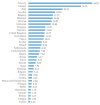Protein Supplements and Their Relation with Nutrition, Microbiota Composition and Health: Is More Protein Always Better for Sportspeople?
- PMID: 31013719
- PMCID: PMC6521232
- DOI: 10.3390/nu11040829
Protein Supplements and Their Relation with Nutrition, Microbiota Composition and Health: Is More Protein Always Better for Sportspeople?
Abstract
Sports nutrition products are developed and targeted mainly for athletes to improve their nutrient intake, performance, and muscle growth. The fastest growing consumer groups for these products are recreational sportspeople and lifestyle users. Although athletes may have elevated physiological protein requirements and they may benefit from dietary supplements, the evidence regarding the role of dietary protein and supplements in the nutrition of recreational sportspeople and sedentary populations is somewhat complex and contradictory. In high-protein diets, more undigested protein-derived constituents end up in the large intestine compared to moderate or low-protein diets, and hence, more bacterial amino acid metabolism takes place in the colon, having both positive and negative systemic and metabolic effects on the host. The aim of the present review is to summarize the impact of the high-protein products and diets on nutrition and health, in sportspeople and in sedentary consumers. We are opening the debate about the current protein intake recommendations, with an emphasis on evidence-based effects on intestinal microbiota and personalized guidelines regarding protein and amino acid supplementation in sportspeople and lifestyle consumers.
Keywords: amino acid; dietary supplements market; gut microbiota; high-protein diets; protein fermentation; protein metabolism; sports nutrition.
Conflict of interest statement
A.K., C.G.-G., O.-M.P., H.E.-N. and M.K. have no conflict of interest to declare. At the time of writing, A.M.T. was employed by Valio Ltd. Valio Ltd manufactures and markets protein supplements, protein drinks and protein snacks. Valio Ltd has no role in the design and content of the manuscript.
Figures
References
-
- Bianco A., Mammina C., Paoli A., Bellafiore M., Battaglia G., Caramazza G., Palma A., Jemni M. Protein supplementation in strength and conditioning adepts: Knowledge, dietary behavior and practice in Palermo, Italy. J. Int. Soc. Sports. Nutr. 2011;8:25. doi: 10.1186/1550-2783-8-25. - DOI - PMC - PubMed
-
- Bradley D. Study on Food Intended for Sportspeople: Final Report. European Commission, Directorate General for Health and Food Safety; Brussels, Belgium: 2015.
-
- Ranganathan J., Vennard D., Waite R., Dumas P., Lipinski B., Searchinger T. Shifting Diets for a Sustainable Food Future. World Resources Institute; Washington, DC, USA: 2016. Working Document: Creating a Sustainable Food Future, Installment 11.
Publication types
MeSH terms
Substances
LinkOut - more resources
Full Text Sources
Medical



